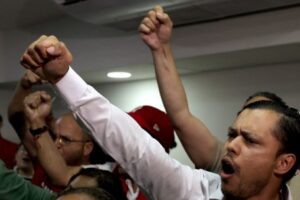
The appearance of the Internet has exponentially accelerated the process of evolution into which our species was born. Science progresses ever faster, fomenting radical changes in human relations, both within ourselves and with other physical or virtual beings. We human beings are not the same as we were 20 years ago: everything has changed and politics cannot be the same.
There is an abundant bibliography on these changes, produced especially by United States academics with their focus on the study of the concrete behaviour of human beings. It is worth mentioning the book by MIT (Massachusetts Institute of Technology) researcher Román Gubern, El eros electrónico sobre las implicaciones emocionales y afectivas de la sociedad hiperconectada en la vida cotidiana, la sexualidad y la forma en que nos comunicamos. The second chapter, speaking of “la sociedad del espectáculo” (“the entertainment society”)” is especially important for our issue.
For what is currently happening with physical and verbal violence, we have to quote again the Canadian experimental psychologist Steven Pinker, a professor at Harvard, Stanford and the MIT and the author, among other books, of The Better Angels of Our Nature: Why Violence Has Declined. Countering the most widespread trends of opinion, Pinker says that where it has the most impact, technological progress, far from increasing violence, reduces it.
In Western societies, the higher the development of science and technology, the less the physical violence, although at the same time verbal and symbolic aggression is on the rise. Cruelty, disease and death are less frequent than before although we are stunned by the irreverence, the angry yelling and the vulgarity which have become the most extended forms of communication.
If a group of Dominican friars abduct three women in the neighbourhood, torture them until they confess to dancing with The Devil and then burn them alive, they would not be applauded by society as in the Middle Ages but would end up under arrest. The tortures and murder laid by their perpetrators at the altars of Christianity are seen as a degradation although in other cultures they currently continue being respected and encouraged. Even suicide terrorists are seen as something pleasing to God and taking them to Heaven.
Without going so far, this has also changed in our country. When they were young, the La Cámpora militants did not kidnap or kill anybody, only committing low-intensity vandalism to get jobs and buy themselves an upmarket car. The state terrorism of President Javier Milei denounced by some has not triggered the disappearance of thousands of opposition politicians, as happened with the Triple A of José López Rega. It is limited to the broadsides of government tweeting and the constant presidential attacks against opposition politicians, journalists, artists and almost everybody who disagrees with his government.
The presidential aggression unfolds in a world in which any neighbour may install in their house a television channel to insult, slander and denounce anybody they like. The more anonymous the assailant, the more violent with their victims. Nobody is free from being the target of an unemployed person, especially if well-known and identified with a cause.
The brutality with which some people speak of authorities and social celebrities is unprecedented. What some historian once said has come to pass: a butler cannot realise that he is working for an important personality because he has seen them in their underwear. Most of our current leaders are more intelligent and better informed than in the past but some of their critics are more interested in their dirty linen than in analysing what makes them important.
Society has become more democratic. The idea of politics as a career, learning the art of political leadership by occupying seats in parliaments, municipal councils and cabinets before presiding over a country has fallen into disuse. I’ve known on all sides people whom Jorge Asís would call “professional politicians,” who spend all their lives 24/7 engaged in politics.
Their knowledge is the fruit of an experience which cannot be learned at any university nor is within the reach of any consultant using scientific tools. Learning from them is indispensable for understanding any country but from an electoral viewpoint, that experience has lost prestige. In most countries having a good curriculum vitae is like having a criminal record. Most people are dazzled by this novelty. It is easier to win being unknown and weird than by being masterly. When an experienced politician is the candidate, their biggest challenge is to be seen as something new, somebody who is not one of those “politicians of always.”
Politics is confrontation to win power. Attack has functions which we will carefully analyse in the Internet course which we will be giving as from this month at the Universidad del Sur de Buenos Aires, belonging to Grupo Perfil. But, like everything, its functions have varied in show-time society. For some time there have been clues as to what it is happening on this front, which became more acute with the pandemic.
The old behavioural norms are no longer respected. There are no limits to violent languages nor to intrusion into the private lives of people. Privacy is dead. Every day we are filmed by dozens of police cameras, by our neighbours or any voyeur. Everybody has a mobile telephone permitting them to film anything and use the images to assemble a scandalous story. Artificial intelligence helps people to invent situations with total plausibility – it is difficult to distinguish the real from the invented. Anything unfounded stays floating in cyberspace and everybody’s honour is at risk – refutation is never possible in the post-truth society.
For some time scandal has been used as a tool to run the political agenda. Anne Lewis, former US president Bill Clinton’s communications secretary, explains it well in an essay published in Spanish in Buenos Aires by Crujía, which is in the book Cambiando la escucha. This is one of the uses of attack to which the current government frequently resorts. Managing the country’s agenda is an aspiration of every president. Mexican ex-president Andrés Manuel López Obrador succeeded with his mañanera morning press conferences, Milei is doing the same with his rowdy communication.
But this game has risks if abused. It has been one of the reasons why the leaders of 21st-century socialism have been unable to keep power by democratic means. All of them mercilessly attacked, persecuted and mocked dissidents.
The most primitive, Nicaragua’s Daniel Ortega and Venezuela’s Nicolás Maduro, have needed to use force to stay in power, despite the massive opposition of the population. In both cases they installed sinister military dictatorships, killing and torturing their opposition and destroying the free press.
For 10 years, Ecuador’s Rafael Correa dedicated Saturday afternoons to insulting anybody he liked. He persecuted most indigenous and trade union leaders, those who defended legislation in favour of women and journalists or anybody who thought differently or dared to defy his majesty.
In his last term, knowing he could not clinch re-election, he put up his vice-president Lenín Moreno, with the intention of handling him but those who are elected presidents tend to believe that they have been elected for that purpose and not to be loyal to their mentors. The accumulation of insults has had its price – ever since he could not be re-elected, all the opinion polls show most people in Ecuador saying that they would never vote for Correa or his candidates. He has suffered three consecutive defeats with his plans in disarray.
Something similar happened to Evo Morales, who governed Bolivia for almost two decades. Like Correa, he persecuted and insulted the opposition, expropriating their belongings and accumulating enemies. The latest opinion polls make it clear that his negative image would prevent him from being elected president. His support would be lethal for his party comrades Luis Arce or Andrónico Rodríguez. A broad majority of Bolivians say that they would never vote for Evo nor any candidacy backed by him. Morales placed Arce in the presidency to keep power – now he is his bitterest adversary.
In Argentina, Cristina Fernández de Kirchner organised a variant of left-wing Peronism geared to showtime. She has been the only woman to win the Presidency of her country, both times in a single round and the country’s most important political personality so far this century. Her uncontrollable aggression led her to say that Argentines should fear God and her “a bit.” She attacked many people, persecuting all those who did not support her “national and popular” vision. Knowing that she could not be elected again, she placed her own puppet who, once in the Casa Rosada, felt himself to be president and baulked.
Fernández de Kirchner’s prison sentence has given a boost to her leadership – Peronism has been forced to unify in her support. She is an international personality, somebody like Brazil’s Luiz Inácio Lula da Silva would not visit just anybody but the die is cast with no going back. Like Evo and Correa, she has a minority which firmly supports her but most say that they would never vote for her or for any new puppet she might invent.
In the course which we are starting, we will analyse the advantages and dangers of attack. According to traditional theory, attacks should only be launched if they gain new votes or adherents, or if they achieve strategic objectives which help to win elections. How many votes does La Libertad Avanza win insulting Jorge Fontevecchia, Carlos Pagni, Fabián Doman, Florencia Peña or Lali Espósito? Each one of them is respected and loved by a group of Argentines. Is it worth continuing to add adversaries? What are the consequences of irascibility in the medium and long term?
In this society, violence is more show than real aggression but it jades when repeated excessively and nor does it have much to do with the demands and dreams of people. The serious thing is not that those who insist on this game lose credibility but that they start to bore. When predictable, the candidate or president loses their charm. This could affect Milei more because his best credentials are authenticity and novelty.
It is prudent to analyse things objectively. In all the elections this year, abstention was close to a half, something which should not be happening if there really is a process of transformation backed by most Argentines. In some of these elections, such as Buenos Aires City, the abstention was massive although some of the country’s main leaders were campaigning with the machines of both the national state and the local government in play.
The votes of La Libertad Avanza (LLA) have not been that good. In the City they defeated a PRO which they had gone absorbing, playing a skilful cat and mouse game. Given the abstention, their successful 30 percent did not even add up to 20 percent of porteños. Peronism finished very close with 27 percent of the votes and PRO third on 16 percent.
In Chaco, LLA ran as an annex of the local governor’s list, which took 45 percent, followed by Peronism with 33 percent and the Frente Renovador with 11 percent. In Formosa, Gildo Insfrán – a symbol of the most antiquated Peronism – swept the field while LLAC did not reach 10 percent. In Jujuy, an alliance of centre-left parties took 38 percent as against 21 percent for the LLA. In all other provincial elections, La Libertad Avanza did not finish top, sometimes coming third. This would not seem the best situation to keep adding to the opposition.
In Buenos Aires Province it is probable that a unified Peronism and La Libertad Avanza absorbing the PRO will face off. This will be the final battle of an old way of doing politics.





